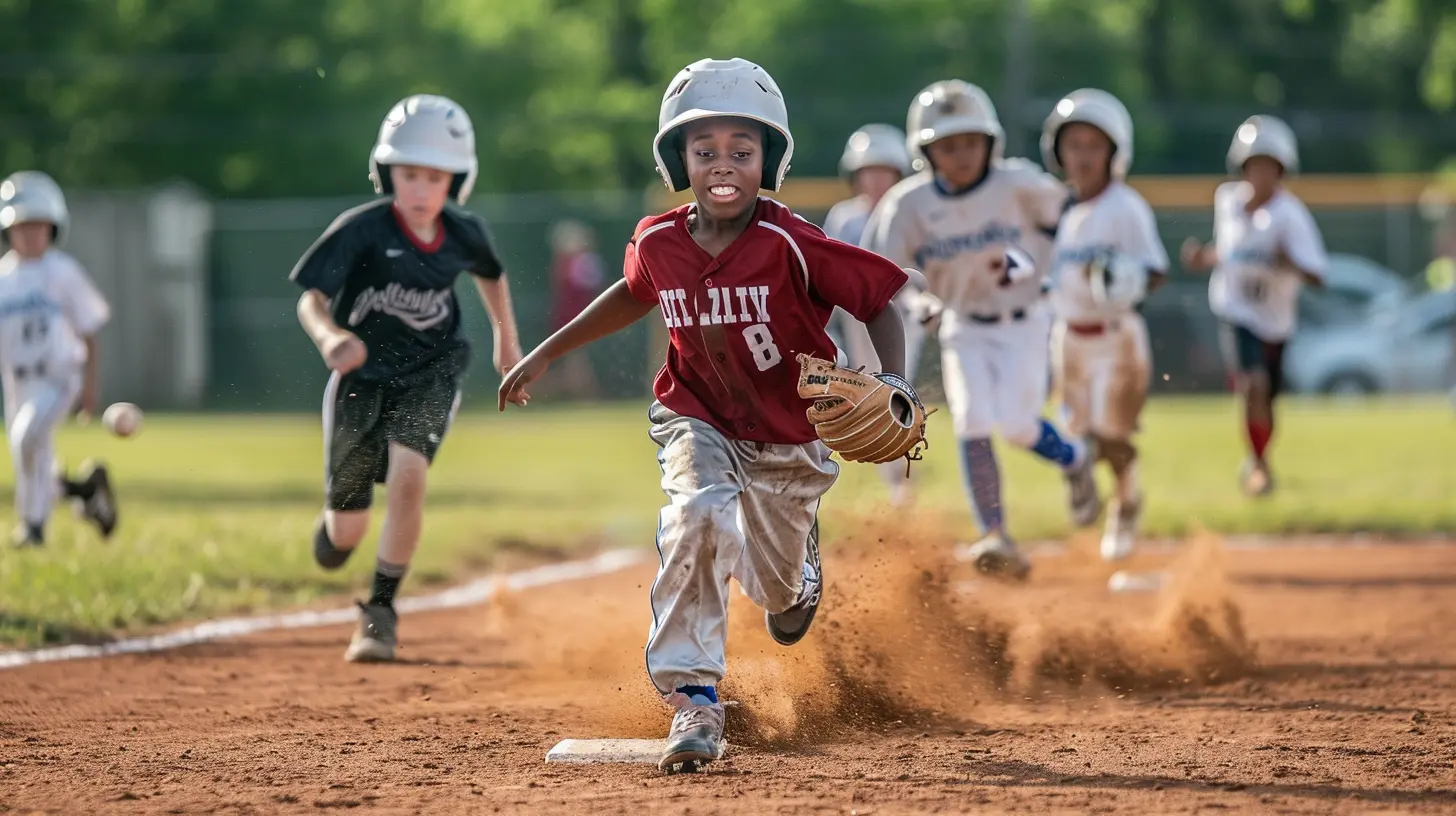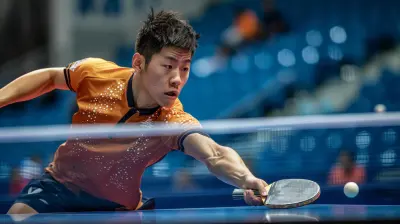How to Create a Positive Team Culture for Young Athletes
25 June 2025
Let’s face it—coaching young athletes can sometimes feel like herding hyperactive squirrels wearing cleats. One minute they’re focused, the next they’re throwing grass at each other. But here’s the deal: behind the chaos is an amazing opportunity to create something special—a positive team culture that helps kids grow not just as athletes, but as people.
Creating a strong, uplifting environment doesn’t just happen by accident. It takes intention, heart, and a good sense of humor (trust me on that one). So grab your whistle, lace up your sneakers, and let’s dive into how you can build a team culture that makes young athletes feel like champions on and off the field.
🧠 What Exactly Is Team Culture?
Before we start tossing around drills and locker room pep talks, let’s get clear on what we’re talking about.Your team culture is basically the vibe, the values, and the way your team operates together. It’s how your players treat each other, how they handle wins and losses, how they respond to adversity, and how much fun they’re having. Yes—fun matters. A lot.
In short, it’s the glue that holds everything together. And for young athletes, that glue needs to be sticky with positivity, respect, and empowerment.
🌱 Why It Matters for Young Athletes
Kids and teens are like sponges—they soak up everything around them. That means the team atmosphere you create will impact their:- Self-esteem
- Teamwork skills
- Motivation
- Attitude toward sports…and life
A positive team culture teaches them how to support others, bounce back from mistakes, grow from challenges, and yes—have a blast doing it. Isn't that the whole point?
⛳ Start with the Coach (Yep, That’s You!)
Let’s be real—if you want a positive team, it’s got to start at the top. Kids will mirror YOUR behavior. So ask yourself:- Do I keep my cool when things go sideways?
- Do I treat every player fairly?
- Do I stay upbeat, even after a tough game?
- Do I model respect and encouragement?
You can’t expect your players to be supportive, respectful, and positive if you’re stomping up and down the sidelines like a firecracker with a fuse problem. Be the example, and they’ll follow.
🤝 Set the Tone on Day One
The very first practice? That’s your chance to establish the tone. And it better be clear: we’re here to grow, encourage, and have fun.Here’s how you can make a solid first impression:
- Set expectations for behavior (both on and off the field)
- Talk about team values like respect, hustle, kindness, and effort
- Let them know mistakes are okay—they’re part of the process
- Encourage players to be a voice, not just a pair of feet
When everyone knows what kind of “vibe” the team is going for, they’re more likely to buy in and bring their best selves.
💬 Communicate Like a Pro
Communication is the lifeline of any good team. But for kids? It’s everything.Make it Simple and Clear
Young athletes thrive on clear, digestible communication. So ditch the fancy jargon and keep it simple. Instead of barking, “Zone defense, box out the second wave!” try something like, “Stick with your buddy and keep your hands up!”Stay Positive (Even When Correcting)
Correcting mistakes doesn’t mean crushing spirits. Sandwich criticisms with positives:> “You were hustling your heart out! Next time, try to stay in your zone. But I love how you didn’t give up—awesome work.”
That one sentence? Pure gold for a young athlete’s confidence.
Encourage Peer Communication
Have players give shoutouts to each other during practice or after games. It builds trust, boosts morale, and helps shy kids feel included.🎯 Set Team Goals (Big and Small)
Having a goal gives your team something to rally around—like a compass pointing them in the right direction.Make Them Motivating But Realistic
Try focusing on effort over outcome. Instead of saying, “We’re going undefeated this season,” say, “Let’s be the hardest-working team out there.”Examples of great team goals for young athletes:
- Everyone gives 100% effort every game
- We support each teammate, no matter what
- Mistakes are okay—quitting is not
- We celebrate small wins (like mastering a new skill!)
Get their input too. Kids love being part of the process. Let them vote on a team motto or choose a fun reward for hitting a goal.
🤗 Foster Friendships & Trust
If you want players to play for each other, not just with each other, they need to feel connected. That means investing time into building relationships.Team Bonding Activities
You don’t need to rent a ropes course or go full-on reality show. Simple stuff works:- Post-practice snack huddle
- Mini relay races with goofy challenges
- "Teammate of the Day" shoutout circle
- Group warm-ups where older players pair with younger ones
Let Kids Be Kids
Don’t squash the laughter, the inside jokes, or the silly cheers. That’s the stuff they’ll remember long after they forget the score.🛡️ Build a Safe Space to Fail
This one’s huge. Kids need to know that failing doesn’t make them a failure. It makes them brave.Celebrate Effort Over Perfection
Make a big deal about the kid who tries something new—even if they mess it up. Say things like:- “Way to step out of your comfort zone!”
- “That was bold—I love it!”
- “You’ll get it next time. Keep swinging.”
Normalize Mistakes
Have players share “oops" moments and what they learned from them. It'll build resilience and show them they’re not alone.✨ Recognize Every Role
Not every kid is going to be the MVP. But every player matters.Give every athlete a role to own—whether it’s leading stretches, cheering loudest from the bench, or being the team’s post-game photographer.
When everyone feels valued, they’ll put more heart into the team.
🧭 Encourage Leadership at Every Level
Leadership isn’t just for captains. Empower all your players to step up in different ways.- Got a shy kid? Encourage them to lead a warm-up.
- Is one player always upbeat? Let them energize the group before the game.
- See someone helping a teammate? Call it out and praise it in front of everyone.
Little acts of leadership add up in big ways.
😄 Make Fun a Priority (Seriously!)
Look, it’s called playing sports for a reason, right?If your practices feel like military boot camp, you’ll lose your team’s love for the game—and fast.
How to Keep It Fun:
- Add music to warm-ups- Throw in silly drills or games
- Celebrate “weird wins” like best hustle or funniest moment
- Let them pick a practice or scrimmage theme (costume day, anyone?)
Happy players = hard-working players. When kids enjoy being part of your team, they’ll give more and grow more.
🔁 Consistency Is King
Building a positive team culture isn’t a one-and-done thing. It takes daily effort. The key? Consistency.- Keep your values front and center every practice
- Don’t let bad habits slide
- Reward the behaviors you want to see
- Stay patient—it’s a marathon, not a sprint
And trust me, even when it feels like it’s not hitting home... it is. One small comment, one kind gesture, one moment of encouragement could change a kid’s whole mindset.
💌 Final Whistle: Your Impact Lasts a Lifetime
You’re not just coaching techniques. You’re coaching people.The culture you build today will shape how your athletes handle pressure, how they treat future teammates, how they handle life’s curveballs, and—spoiler alert—how they coach their own kids someday.
So be the coach who says, “I believe in you,” even after a missed shot. Be the one who turns misfits into teammates and makes the bench feel as important as the starting lineup.
Creating a positive team culture isn’t just about wins. It’s about creating a place where kids feel seen, valued, and loved—for exactly who they are.
And if you can do that? You’ve already won.
all images in this post were generated using AI tools
Category:
Youth SportsAuthor:

Uziel Franco
Discussion
rate this article
2 comments
Seraphis McLoughlin
Positive team culture nurtures resilience, unity, and growth—essential foundations for young athletes' success.
November 5, 2025 at 4:02 AM

Uziel Franco
Absolutely! A positive team culture fosters essential qualities that empower young athletes to thrive both individually and collectively.
Rocket Kelly
Great tips! A positive culture boosts confidence and teamwork in young athletes!
July 4, 2025 at 4:37 AM

Uziel Franco
Thank you! I'm glad you found the tips helpful. Building a positive culture is key to fostering confidence and teamwork!


